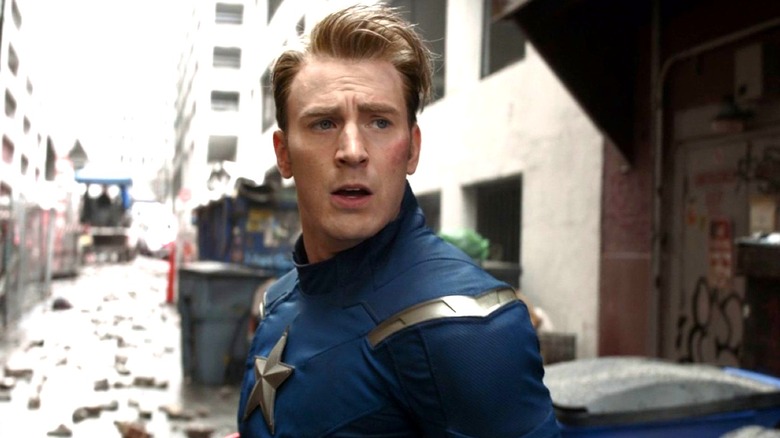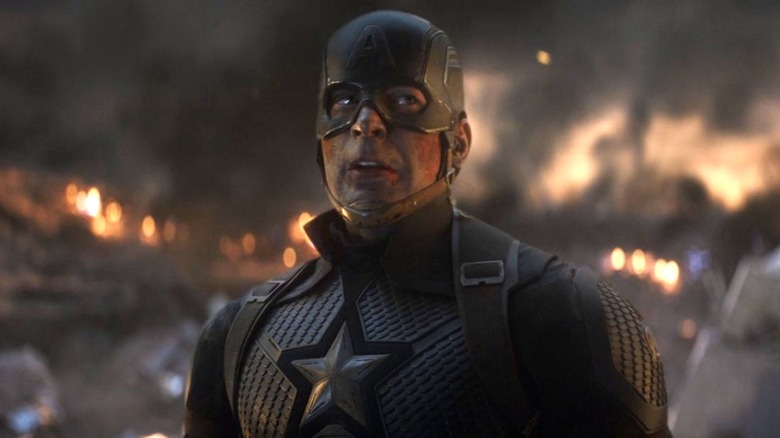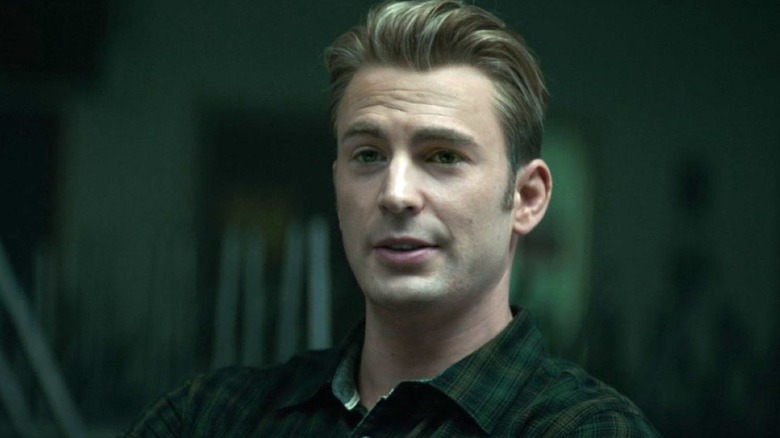Should Avengers: Endgame Have Given Us A Much More Intimidating Captain America?
Remember that moment in "Avengers: Infinity War" when the unthinkable happened? When we sat in the theaters and watched our favorite heroes from the last decade do what we never thought possible and lose to Thanos (Josh Brolin)? Now imagine the emotions you felt amplified by an infinite amount by being one of the characters in the situation who failed and allowed half of life to be snapped out of existence. Steve Rogers, aka Captain America (Chris Evans), felt that. And now, thanks to Scott Lang (Paul Rudd), we've learned that he wasn't always as calm and collected as he appeared in "Avengers: Endgame."
Occasionally, a movie or television show will showcase a book that fans are curious to read. "How I Met Your Mother" released a real-life copy of Barney Stinson's (Neil Patrick Harris) "Playbook," and you can read Richard Castle's (Nathan Fillion) actual mystery novels from "Castle." In "Ant-Man: Quantumania," Lang released a memoir of his time as an Avenger called "Look Out for the Little Guy" – and it was actually published, so you can pick up your own copy and get a deeper look at the MCU. In it, Lang describes when he returns from the Quantum Realm to discover that half of all life is gone. While getting caught up by Rogers and Natasha Romanoff (Scarlett Johansson), he refers to those snapped away as "missing people," at which point Rogers let his anger get the better of him, scolding Lang that the effects were felt across the entire universe, not just Earth.
The rare moment of anger is uncharacteristic for Rogers, who is always the bigger man when conflict arises. But was what the passage describes precisely what the character needs?
Missing piece, or an uncharacteristic reaction?
Would the MCU's Captain America losing his cool be uncharacteristic? Or is it what the character needs to feel more real after all the tragedy he saw? His anger is certainly justified, as he and everyone else lost half of the world post-"Avengers: Infinity War." Plus, it could have been interesting to see this unexplored side of him in the MCU. The closest he ever got to doing so may be on the helicarrier in "The Avengers" while arguing with Tony Stark (Robert Downey Jr.). But time and again, Steve Rogers' calm demeanor is why he often leads the Avengers to victory.
We know that Cap makes mistakes, which humanizes him a bit. He should have told Stark about Bucky (Sebastian Stan) and his involvement in his parents' murders, and he probably should have seen more of the corruption within S.H.I.E.L.D. long before they almost launched their endgame. Briefly losing his cool at Scott Lang seems to reveal the missing piece of his personality. The man has been through some of the worst things anyone alive has ever seen. He saw WWII with his own eyes. He lost his parents, his friend, and three-quarters of a century. However, how come we haven't seen his frustration play out? In any case, the passage in "Look Out for the Little Guy" gives us the opportunity to question if this version of Cap works.
In the end, we got the typically helpful Steve Rogers
Ultimately, and as the bow to the MCU franchise, it feels disingenuous to veer too far away from Rogers' reliable character in "Avengers: Endgame." When we pick up with Steve at the start of "Avengers: Endgame," he runs a support group for the survivors of the Blip. Here, he's the Captain America we know and the Avengers have relied on, one who comes across as a compassionate man who made peace with what happened in the five years since the snap. Similarly, his collected approach gives us hope that the team will succeed after such an earth-shattering loss.
While he spent the last decade (longer if you include his time in World War II) fighting on the global stage to protect the Earth, at the end of the day he's simply a small-town kid from Brooklyn, just wanting to do his part to help. He joined the Army to do as much or as little as possible. Others were laying down their lives, and according to Cap, he has "no right to do any less than them." After the Blip, it stands to reason that he'd eventually feel humbled to support humanity with care. An angry Cap would just be too bleak for a superhero film handling mass genocide.
Starting a support group also makes sense because it would be exactly what his fallen friend, Falcon, would have wanted. When Rogers meets Sam Wilson (Anthony Mackie) in "Captain America: The Winter Soldier," he runs a support group for veterans returning from war. Surviving battle and dealing with trauma is how they bond, and Rogers starting a support group is the perfect way to honor his fallen comrade — and be the Captain America the MCU needs. In the end, we're glad to have seen him rise above his likely frustrations.


